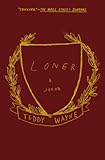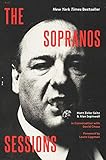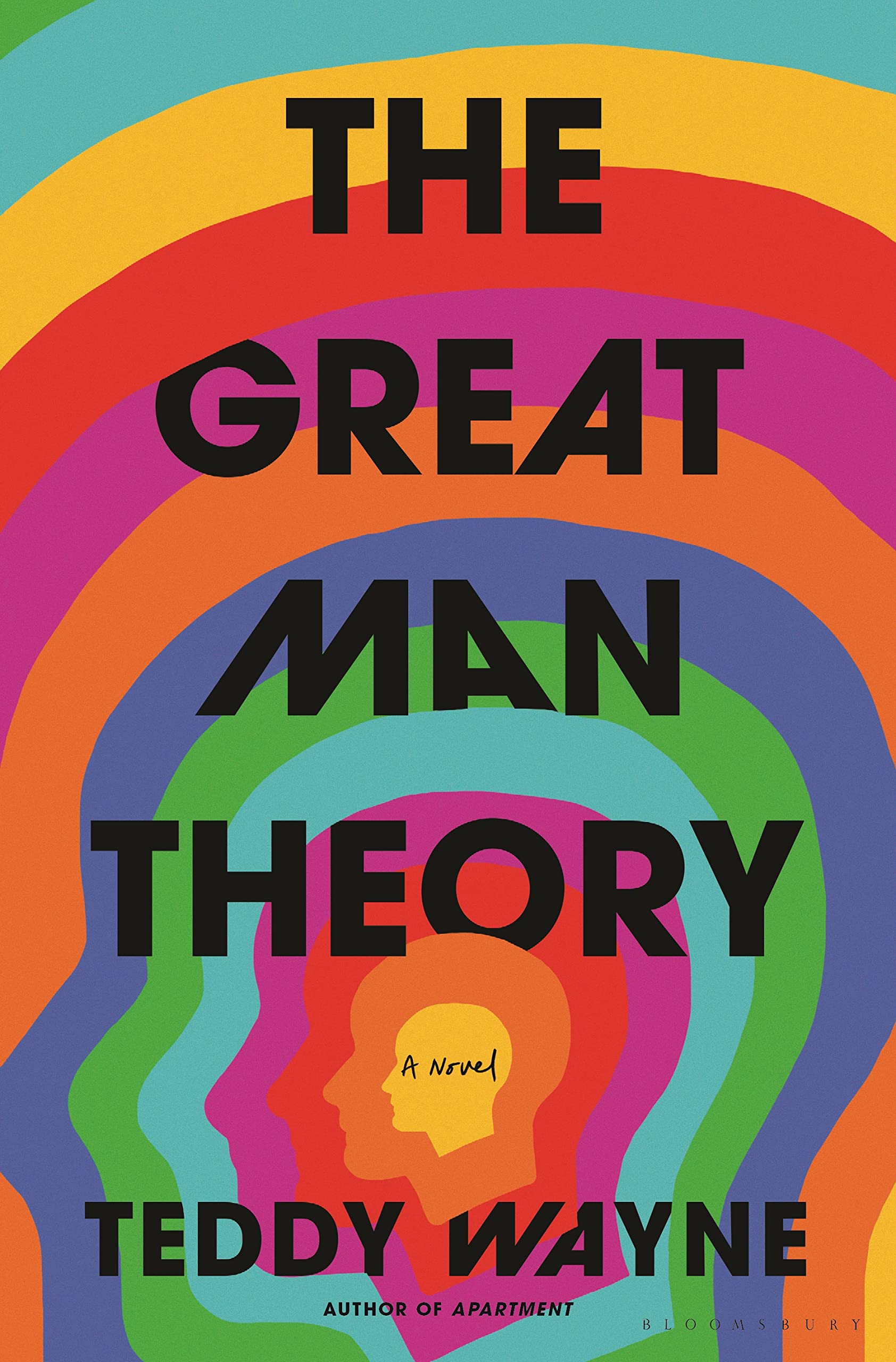Early in the Trump years, novelist Teddy Wayne grew so irate at the seemingly endless river of presidential perfidies that he and his wife, the novelist Kate Greathead, had to establish a safe word to indicate that it was time for his political ranting to end. Years later, with Trump out of office (but not yet out of mind), Wayne has off-loaded some of that free-floating ire onto the protagonist of his latest novel, The Great Man Theory. Paul, a recently demoted adjunct instructor of freshman comp, is angry not only at the president but at our entire dumbed-down, media-obsessed modern age. Except that Paul doesn’t have a wife—she’s ditched him for a “Tom Cruisian” second hubby—so he has no one in his life to help him edit his rants.
In The Great Man Theory, we watch the slow-motion meltdown of a proud would-be public intellectual undone by his outrage at a world gone wrong and at his inability to accommodate himself to its digitally mediated demands. But what makes the book a joy to read is Wayne’s deep empathy for his sad-sack protagonist, who, for all his preening moralism, remains a dedicated teacher and a loving, if sometimes inept, father to his preteen daughter.

 Wayne is the author of four previous novels, including Loner and The Love Song of Jonny Valentine, and regularly writes for the New Yorker’s “Shouts and Murmurs” column. We caught up with him recently for an email interview about The Great Man Theory, which comes out today.
Wayne is the author of four previous novels, including Loner and The Love Song of Jonny Valentine, and regularly writes for the New Yorker’s “Shouts and Murmurs” column. We caught up with him recently for an email interview about The Great Man Theory, which comes out today.
Michael Bourne: As I read The Great Man Theory, I was doing that thing where you cast the book for the movies, and it seemed obvious to me that your protagonist, Paul, should be played by Paul Giamatti. Which reminded me that Paul Giamatti has been getting a lot of work in the last decade or two. Why do you think this character of the hapless, yet aggrieved middle-aged white guy has become such a cultural staple? Is this character a part of the present zeitgeist or has he always been around in our books and movies?

 Teddy Wayne: Historically, there’s certainly been no deficit of disaffected or disenchanted middle-age white male protagonists in American literature. But those unhappy characters typically chafed against their putative success, from the man in the grey flannel suit to the Armani-clad Wall Street psycho. There’s been a marked diminution in the white male’s self image that mirrors the decline of America’s stature since 9/11. (Or since at least 1999: that year, in the first episode of The Sopranos, Tony laments that he “came in at the end—the best is over,” and that fall the film version of Fight Club depicted various crises of modern masculinity).
Teddy Wayne: Historically, there’s certainly been no deficit of disaffected or disenchanted middle-age white male protagonists in American literature. But those unhappy characters typically chafed against their putative success, from the man in the grey flannel suit to the Armani-clad Wall Street psycho. There’s been a marked diminution in the white male’s self image that mirrors the decline of America’s stature since 9/11. (Or since at least 1999: that year, in the first episode of The Sopranos, Tony laments that he “came in at the end—the best is over,” and that fall the film version of Fight Club depicted various crises of modern masculinity).
Throw in the 2008 recession and a steep drop in military veterans (from 37 percent of the male population in 1950 to about one in eight now) and the U.S.’s disastrous record in wars since 1945, and you get a country of men who perceive themselves as being weaker and poorer than those in their father’s and grandfather’s America. It’s no surprise that post-9/11-culture introduced all those feckless losers—the Giamattis, the Walter Whites, the Judd Apatow characters—as well as the compensatory buff of superheroes to shore up fragile egos. The rapid gender and racial shifts of the past decade or so have further threatened the white male, accelerating his descent into a state of aggrievement or, worse, anger; whereas the younger ones have a chance to come of age seeing these changes as signs of progress, the older ones are more likely to feel that for them, too, the best is over.
 MB: So how did you come to write this character? I know you a little, and you strike me as neither hapless nor aggrieved. And it’s not just Paul from The Great Man Theory. The protagonists of your last two novels, Apartment and Loner, are socially awkward, sometimes malevolent guys. Why are you drawn to writing these characters, do you think?
MB: So how did you come to write this character? I know you a little, and you strike me as neither hapless nor aggrieved. And it’s not just Paul from The Great Man Theory. The protagonists of your last two novels, Apartment and Loner, are socially awkward, sometimes malevolent guys. Why are you drawn to writing these characters, do you think?
 TW: The narrators from my first two novels, Kapitoil and The Love Song of Jonny Valentine, were far more talented and lovable figures, so it’s been more of a recent trend. In part, I think writers in their early books—especially their first, when readers assume a debut is veiled autobiography—are concerned with how they may come across as authors and therefore strive to create likable protagonists. Having gotten that out of my system, I seem to be going the opposite direction, nearly inviting readers to confuse me with the last three protagonists, all of whom share at least some details of my own life and are repellent to varying degrees.
TW: The narrators from my first two novels, Kapitoil and The Love Song of Jonny Valentine, were far more talented and lovable figures, so it’s been more of a recent trend. In part, I think writers in their early books—especially their first, when readers assume a debut is veiled autobiography—are concerned with how they may come across as authors and therefore strive to create likable protagonists. Having gotten that out of my system, I seem to be going the opposite direction, nearly inviting readers to confuse me with the last three protagonists, all of whom share at least some details of my own life and are repellent to varying degrees.
But the bigger factor is the political and cultural environment. Loner came out in September 2016, so while it’s technically a product of the Obama years, it feels more like a precursor to the gender and class dynamics of his successor’s reign, and Apartment and The Great Man Theory were both started during the Trump administration. I can understand a desire for art to serve as a beacon in benighted times, but I’ve been more interested in exploring commensurately darker characters—in particular, men who are responding with growing frustration and aggression to their changing status.
MB: The Great Man Theory is indeed deeply engaged with the culture
and politics of the Trump era. In a recent Publishers Weekly interview, you said: “I was obsessed with the Trump administration, but I didn’t want to write a sanctimonious novel, a takedown.” What specifically were the pitfalls you were trying to avoid? And why not a takedown? What’s the danger, in an artistic sense?
TW: In the early days of the Trump presidency, when the shock was fresh and violated norms still came off as abnormal, I would read the news at night and rant to my wife about the latest horror. She was in agreement but found my jeremiads hard to take before bedtime—so much so that we introduced a kind of safe word to indicate that I needed to wind down. (It was “sufficient.”) So, the biggest pitfall would have been writing just that, a book-length tirade about the obvious—that Trump is a corrupt, incompetent, bigoted con man; his cronies in politics and media are cowardly cynics; and his followers are greedy or ignorant or racist—while preaching to the choir, readers of literary fiction who are overwhelmingly liberal and who, too, would tire of being told what they already know.
The path I hit upon was to write a character who was like me in his hectoring outrage, but to regard him from a slight, at times comic, distance so that the book itself did not recreate that unpleasant or tedious experience for the reader. Paul is angry—not just at the unnamed president and his right-wing media enablers, but at his liberal friends for what he sees as their hypocrisy, at younger people for their presumed apathy, and at a consumerist, technocratic society that he believes is anesthetizing us all. Again, many readers are already likely to be in sympathy with some of his positions, and, taken on their own, his ideas might be better served by a nonfiction book. What potentially redeems this as a novel is that Paul is ultimately embittered most of all by his own failures: as a man, a writer, and especially as a father to his young daughter. This tragic quality, I hope, gives his “sufficient” lectures a more acutely painful sting.
MB: I like the idea of a safe word to end political rants. I think we need to institute a national safe word, particularly online. But you’re right about Paul and his daughter, Mabel. Paul loves Mabel deeply, but he also feels a compulsion to curate her life, particularly her media diet, to meet his sometimes fusty standards. What’s your take on this? We’re clearly not supposed to see his political obsessions as healthy. What about his parenting? Is he blowing it there, too? Is it possible to not blow it as a parent these days?
TW: My own children are still too young to be in danger of succumbing to the temptations of the internet, so I can’t speak from a place of real experience, though I’ve already seen how hooked they can get on superficial visual entertainment; they’d watch Tom and Jerry all day long if they could. (My own curation has been to steer them to older movies and cartoons when possible.) If there’s a major overlap between my and Paul’s cantankerous judgments, it’s in the effects of modern technology on all of us, especially children and adolescents. After Paul lectures his students on this topic, one of them raises the point that the internet and social media can be democratizing forces and amplify voices of those who would otherwise be silenced, which I agree with.
Other than that, I think it’s mostly hurt us, as a body politic and as individuals, in all the ways that don’t need to be restated, with the most pernicious effects on those who are too young never to have known a disconnected life. The experience of spending hours by yourself with no external stimuli other than maybe the printed word is getting harder and harder to come by, and at the risk of sounding like a sentence from Paul’s book-in-progress, The Luddite Manifesto, we are losing something essential to our humanity in the process. So, to answer the question in this roundabout fashion: it’s probably not possible to not blow it as a parent, but maybe that’s always been the case.
MB: I know you have adapted some of your earlier novels for TV and film. Is there interest in a screen adaptation of The Great Man Theory If so, what’s that process like? Do you find that elements of the original novel get sanded off in the transfer to screen or does the extended space of a cable series allow you to explore characters and themes that got left out of the novel?
TW: I’m adapting it for a production company for TV. Not to be annoyingly secretive, but I’m not supposed to publicly state which company it is. Without revealing too many details, one change I decided to make with the producers is switching the era and the country so as not to set it in Trump-era America (even though Trump is never named as the president in the novel), to sidestep viewers’ MAGA-fatigue and the skittishness networks have over depicting modern American conservatives as villainous.
With the shorter runtime of a film, you have to pare away the source material and leave only the absolutely essential scenes, and if there’s a character-evoking moment in the novel that doesn’t take place in a scene that moves the story ahead, you have to find a way to incorporate it into one that does. With the longer span of a TV series, there’s still a premium on implacably advancing the narrative, but with some wiggle room to include subplots, minor characters, and smaller scenes that are more about building tone and character.
I find the creative aspects of screenwriting very enjoyable. In my experience, at least, I’ve collaborated with smart people who want to make elevated fare, and I like the craft of the medium quite a bit; there’s something a little mathematical about the form in its emphasis on structure. The business part is less appealing and involves a lot of waiting around for contracts to be reviewed by lawyers, for executives to read things, for decisions to be made by entities you never meet. Ultimately, hardly anything ever gets produced, so I enter into each new project with enthusiasm while also assuming that it won’t get made.
MB: So what’s next for you after The Great Man Theory? Can you talk about your next book or are you worried about jinxing it?
TW: I’m working on a new novel. I’m hesitant to say much about a work in progress, but the protagonist isn’t hapless and aggrieved, which is a refreshing change.









